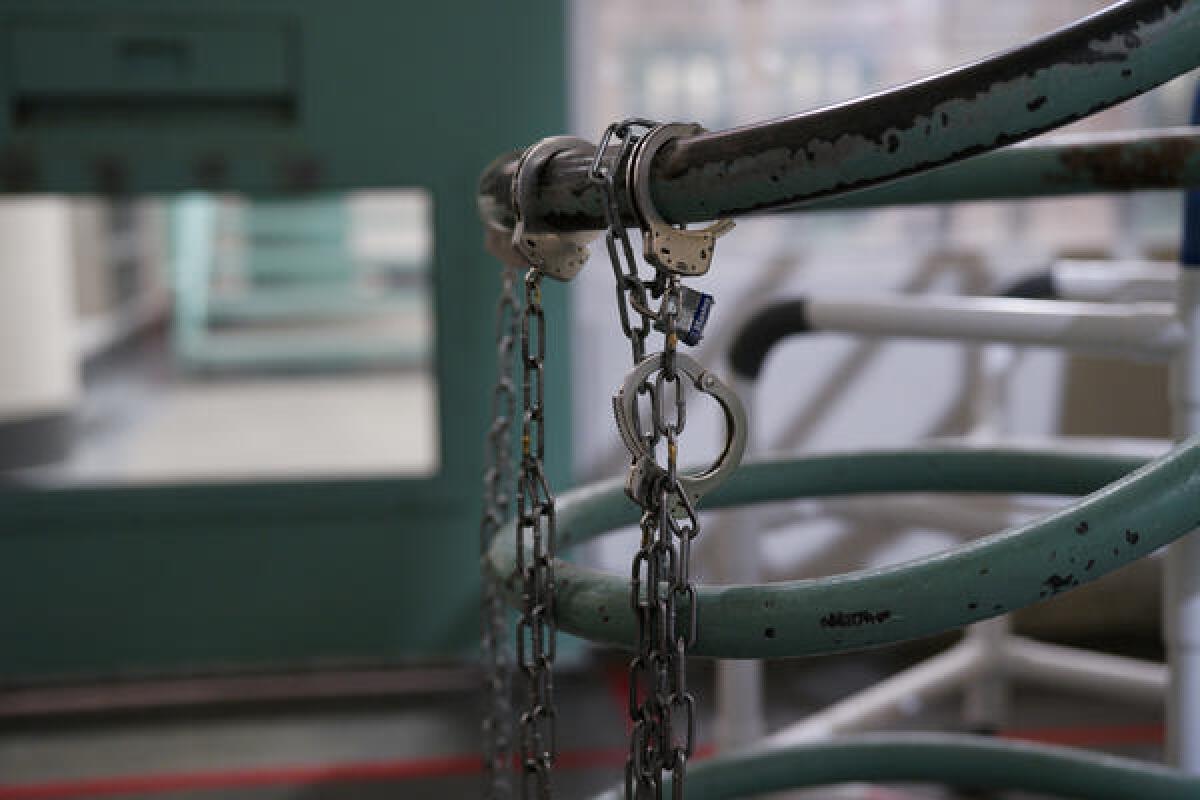San Diego County sheriff’s deputies recorded jail conversations between inmates and their lawyers

Officials say recordings were inadvertent, but at least one went to county prosecutors.
- Share via
The San Diego County Sheriff’s Department recorded dozens of privileged conversations between defense attorneys and their clients for much of the last year and, in at least one case, the recording found its way to the district attorney’s office.
The confidential meetings between lawyers and criminal defendants were recorded between last December and May, and again between August and October, as the Sheriff’s Department implemented protocols aimed at slowing the spread of COVID-19 inside its jails.
Department officials acknowledged the recordings after the Union-Tribune obtained internal emails describing the activity — as well as concerns expressed by a Superior Court judge overseeing an attempted-murder trial.
It is not clear how many conversations were held or how many were recorded.
But the department said Friday it reviewed nearly 300 conversations that took place since December and 37 of those were recorded even though they were between inmates and their lawyers or law offices.
“There were periods of time when professional visits were inadvertently recorded due to unforeseen delays in the phone system disabling the recording feature,” sheriff’s spokesperson Lt. Amber Baggs said in a statement.
Baggs said the department opened an investigation to determine the extent of the eavesdropping and whether any criminal prosecutions were wrongly impacted.
“If such calls are identified in the future, we will notify the district attorney’s office as well as the Superior Court to determine the appropriate response,” she said.
Recording conversations between defense attorneys and inmates is prohibited under state law.
The Sheriff’s Department practice began in mid-December last year, when officials implemented a COVID-19 safety program. That procedure included the suspension of visits by family members and friends of county jail inmates.
The policy was suspended May 1 but reinstated in mid-August, when the Delta variant became a broader threat to public health. It was called off a second time in mid-October.
While social visits with inmates were suspended, professionals meeting with people in jail were directed into those meeting areas — where lawyers, bail-bond agents and others could speak to their clients over telephones but separated by windows.
Baggs said signs are posted in those visiting areas alerting people that conversations are subject to recording. Verbal notifications also were made at the beginning of each discussion, she said.
“Unfortunately, we are not able to simply disable recording of these visits instantly or temporarily for professional visits,” she said. “The process takes time and must be done by Securas.”
Securas Technologies provides communication services in county jails.
Sheriff’s officials did not say how many times jail staff or attorneys requested Securas to disable recording during visits under the COVID-19 protocols.
Social visits between inmates and their friends and relatives are routinely monitored and recorded for law enforcement purposes.
Prior to the COVID-19 pandemic, defense lawyers visiting their inmate clients were typically directed to private interview rooms where their conversations are not subject to recording.
A judge’s request
According to Sheriff’s Department emails, Judge John M. Thompson in El Cajon requested details about conversations being recorded last month, after a defense lawyer raised an objection during an attempted murder trial.
“One of the attorneys informed the judge that his privileged conversation with his client had been recorded while at the jail facility — GBDF,” a sheriff’s sergeant wrote to his lieutenant on Oct. 21, referring to the George Bailey Detention Facility in Otay Mesa.
“This complaint was seconded by the other attorney who stated he was involved in another case where the same had happened to him and his client and where the District Attorney’s Office had a recording/transcript of their conversation,” the email added.
“I have spoken with Judge Thompson and he is very concerned about the many different implications this could have on the upcoming trial and on any other cases that have been or could be heard,” the sergeant wrote.
Thompson declined to comment on the recordings when contacted by the Union-Tribune. The identities of the parties involved in the attempted murder case could not be confirmed by the Union-Tribune, and it is not known whether the recording affected the outcome of the trial.
In his response to his sergeant, the lieutenant acknowledged the seriousness of what had happened.
“The email you (sent) me I will forward up the chain,” the lieutenant replied. “If the judge is correct in his assessment, this matter needs to be looked into.”
The sergeant later received an explanation from Capt. Alan Kneeshaw, who oversees detentions.
“During times of higher COVID case numbers, operations were modified to reduce contact between those in our custody, staff and professional visitors,” Kneeshaw wrote on Oct. 20. “The social visits operate in rooms with solid separation via walls and windows, and are normally recorded.”
Kneeshaw, who copied a Sheriff’s Department lawyer in his reply to the sergeant, said the practice of directing lawyers to meet with their clients in areas normally designated for social visits stopped in mid-October.
“Professional visitations have currently returned to their dedicated areas,” he wrote.
Defense attorneys respond
A spokesperson for Dist. Atty. Summer Stephan said the office is aware that at least one conversation between a defense lawyer and a defendant had been improperly recorded.
“A portion of that conversation was listened to by law enforcement before it was realized that it was a conversation with an attorney,” spokesperson Steve Walker said. “Upon determining the conversation involved an attorney, monitoring the conversation immediately and permanently ceased.”
Walker said his office quickly alerted the prosecutor assigned to the case, and the deputy district attorney notified the defense lawyer that law enforcement had listened to the discussion.
“The D.D.A. and defense attorney entered into a signed stipulation agreeing to turn over the sole copy of the recording to the defense attorney for their use in any future motions or litigation,” the spokesperson said.
Walker said to his knowledge the district attorney’s office had received no other recordings between defense lawyers and their clients. He declined to specify how the recording was sent to prosecutors.
Randy Mize, who runs the county public defender’s office, said the Sheriff’s Department recordings undermine a bedrock constitutional safeguard: privileged communications between an attorney and their client.
He also said the district attorney’s office enjoys unfettered access to conversations recorded by the sheriff — absent any oversight from the Superior Court.
“Defense counsel would be required to file a subpoena seeking permission from the Superior Court for the same recordings,” Mize said. “Without Superior Court oversight, I fear abuses of this gravity may be inevitable.”
The public defender’s office is working with the sheriff, district attorney and the Superior Court’s presiding judge to determine the extent of the privileged recordings and whether any others were disseminated outside the Sheriff’s Department, Mize said.
Herbert Weston, a longtime criminal defense attorney in Vista, said he has raised blanket objections to the Sheriff’s Department’s handling of attorney-client communications for months.
Weston said he has declined to meet with clients in areas designated for inmate social visits because they can be taped. He said his inability to speak with clients in confidential settings has affected at least 20 clients, delaying proceedings while they remain in custody.
“I had 12 life cases at the beginning of COVID, and not one of them has been tried,” he said. “If you have clients who are accused of a serious crime, how do you effectively represent them if you can’t see them and can’t talk to them?”
The defense attorney said even before the pandemic he declined to speak to his clients over the jail telephone because he fears the do-not-record technology employed by Securas is not completely effective and that the Sheriff’s Department too often records calls that are not supposed to be monitored.
“We have been dealing with this on the defense side for a long time,” he said.
Allegations of illegal taping of conversations between defense attorneys and their clients by law enforcement officials are not new.
In 2019, Alameda County Public Defender Brendon Woods accused sheriff’s deputies of improperly intercepting and recording protected conversations, and filed a motion in Superior Court asking a judge to order a stop to the activity.
In 2018, the Orange County Sheriff’s Department acknowledged that its communications contractor, GTF of Falls Church, Va., had illegally recorded thousands of calls between inmates and their lawyers.
The disclosure prompted outrage among county supervisors at the time, but earlier this year the company’s contract was renewed.
The San Diego Sheriff’s Department said attorney meetings are no longer taking place in areas designed for inmates’ family and friends.
“To avoid this potential issue in the future, we have discontinued this well-intentioned risk-mitigation strategy,” Baggs said. “Moving forward, professional visitors will no longer be allowed to access social visit phones.”
More to Read
Sign up for Essential California
The most important California stories and recommendations in your inbox every morning.
You may occasionally receive promotional content from the Los Angeles Times.











